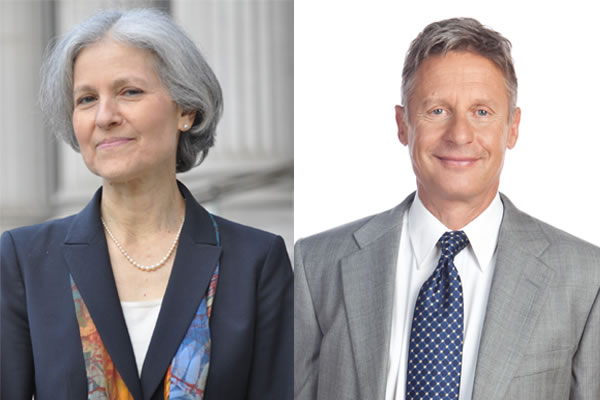Gary Johnson and Jill Stein: Third Party Budget Plans


Gary Johnson and Jill Stein have both put forward government reforms as part of their platforms and, for both candidates, their visions are a stark contrast to what the Democrats and Republicans have in mind for the upcoming fiscal year.
According to a Pew Research Center study conducted in June, Americans are overwhelmingly concerned with jobs, taxes, and federal spending as the primary issues. So, how do the proposals of these third-party candidates plan to address the concerns of the American people?
Jobs
Jill Stein and the "Green New Deal" have opted to tackle the United State's high unemployment in a very direct way: by drafting a new "Economic Bill of Rights."
This Economic Bill of Rights would provide each citizen with a right to employment through a full employment program, aimed at creating 25 million jobs by starting a "nationally funded, but locally controlled direct employment initiative". The driving idea behind this is to eliminate local unemployment offices and replace them with job banks that offer private sector jobs which are stored.
In this plan, any slack in private sector employment is taken up by those who do not have jobs. Another important provision is that the Economic Bill of Rights would guarantee each citizen a fair, living wage as long as they are willing and able to do work. Aside from this, the plan promises affordable healthcare through a single-payer, Medicare-for-all program.
Gary Johnson has chosen to take a much more laissez-faire approach to creating jobs in the private sector, which is the typical choice for a libertarian candidate. Johnson supports less regulation and a fair tax system in all sectors of the economy. He predicts this will provide the economic boon that we need to end our high unemployment.
Taxes
Jill Stein has many planned reforms for the tax system. She claims that her plan would rewrite the entire tax code in order to make a code that is truly progressive. This means tax cuts for the poor and the middle class, as well as tax increases for the wealthiest Americans.
The new code would also require full disclosure of corporate tax subsidies and close many corporate tax loopholes that needlessly add to the deficit. Lastly, her plan would create a 90% tax on bonuses paid out in banks that have been previously bailed out.
Gary Johnson takes a much harder stance on taxes than he chose to on job creation. Johnson believes that the current tax code hinders productivity in the private sector in a multitude of ways, including high marginal tax rates, unnecessary complexity, and incentives for wasteful decisions.
To combat this, he would start by abolishing the Internal Revenue Service. Johnson also supports completely revamping the tax code to create what is referred to as a "Fair Tax", which would only tax expenditures instead of income. The Fair Tax would then eliminate business taxes altogether in an effort to spur economic growth and create jobs.
Federal Spending
In addition to other fiscal reforms as a means of reducing federal spending, Jill Stein would end all corporate bailouts, and break up the banks that are deemed "too big to fail", starting with Bank of America. She would also propose deep cuts in defense spending by ending the wars in Iraq and Afghanistan, as well as closing some 140 military bases in foreign countries.
In contrast to the cuts in defense spending, Stein's plans to provide health care to all citizens would undoubtedly result in more federal spending.
As many libertarians do, Gary Johnson does not support corporate welfare in any form, be it bailouts for banks or for the auto industry. Much like his jobs policy, Johnson would support a hands off approach to the federal government. This means less regulation in the financial sectors, less federal involvement in education, and even legalizing and regulating marijuana.
Most importantly, he would support a balanced budget initiative for 2013. Part of the path to a balanced budget would be repealing "Obamacare", as well as reforming Medicare and Medicaid by giving the power back to the states through the form of block grants. Johnson also supports cuts in defense spending, including the re-evaluation of many military bases scattered throughout Europe and ending the war in Afghanistan.
Both candidates have concrete plans outlined for our financial future, but their views are incredibly different. How are these plans likely to appeal to voters?
Jill Stein has chosen to tackle job creation in a meaningful way, which addresses the primary concern of Americans right now. It is worth pointing out, however, that she has not made the same bold claim that Johnson has in regards to balancing the federal budget, which is realistic point of concern.
Gary Johnson supports less federal intervention in almost every way and promises to balance the budget in his first year in office, but his plan lacks any meaningful initiatives aimed at job growth. This is not to say that his plan does not have job growth in mind. It is more an indication of his overall political philosophy and how a libertarian executive would operate.
The only certainty is that the specificity that both candidates bring to the table is refreshing when compared to the vague visions of the future that we are presented by Washington's two major political parties today.





